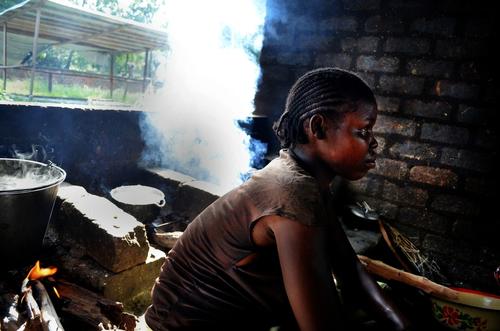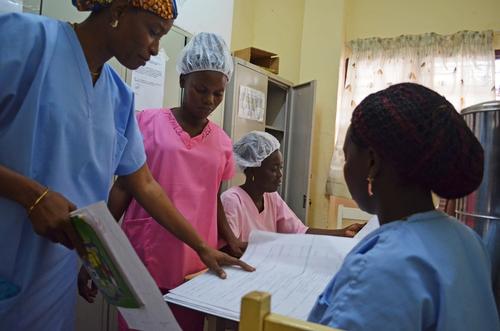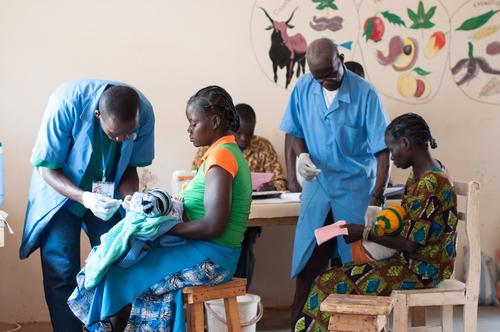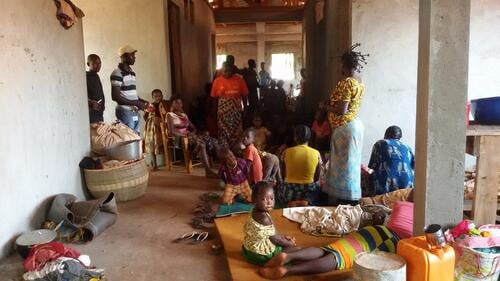"An impossible choice" – Elysé Tando, MSF nurse, Boguila
I am from Boguila, in the northwest of the country. That's where I live and where I work as a nurse with MSF, as I have done for almost 10 years. The situation isn't great at the moment – to the point where I've started to think that I should leave. There are many armed groups active in the area, including one that wants to use the town as its base. Obviously, the leaders in the community do not want that to happen and they opposed the idea. Now the group is hunting them down, harassing them, even killing them systematically because of their opposition.
The people in that group loot homes and rob people when they need money, or whatever else. They lurk in the bush along the main roads and they surprise people that pass by, demanding everything they have. After they have taken all they can off the person, they beat them up or kill them. We hear these kinds of stories all the time – every two or three days! They don't stick around very long, because the 'self-defense' groups generally chase them away once they hear that they've been robbing people.
The consequence of all this is that people are afraid to travel to come to the hospital. MSF is the only organisation that offers free care in the region – there is an MSF structure in Paoua, 80 kilometres away, and another in Bossangoa, a 115-kilometre drive. Sometimes we figure out that an armed group is active on a certain road because we notice that there haven't been any patients arriving from that direction. We don't know how many lives could have been saved if those people had been able to access our services on those days.
In June and July this year, a motorcycle taxi driver was killed on the road just outside Boguila. Apparently, he was robbed and when the bandits had finished with him they killed him. The motorcycle taxi drivers were scared to leave the city, as they worried that the same thing would happen to them. So, it was impossible to find someone that could transport the patients that we needed to refer to another health structure for advanced healthcare. Two babies died of malaria-induced anaemia during that time because we could not send them to get the care they needed.
Recently, one of our patients, a 21-year-old man, died of meningitis because he arrived too late. His family brought him to the hospital around 7am, when he had started to feel sick during the night. They would not leave home when it was dark because of the insecurity. In their village, a man had been robbed and murdered and his body found in the bush nearby the same week. In the morning, they took a moto-taxi to the health centre. Because so much time had passed, the young man arrived in critical condition. He died as I was filling out his transfer slip.
The same problems of access to healthcare are affecting people living with HIV in and around Boguila. They come to us to for their ARV drugs, and if they get sick with an opportunistic infection, we take care of them at the health centre. I recently heard of four deaths in a town not far away, in which an armed group has just established itself. They could not pick up their medications or get themselves to a health centre, and therefore died at home. What a terrible, terrible way to go.
The thing is, we have no way of knowing the actual cost of this violence. If there's insecurity on the roads, people can't move around – either because they're afraid, or because they are physically stopped from doing so – and we never get to see them. When you talk with women who bring their children to hospital too late, they say, "I prefer to stay and bury my child at home, rather than try to leave and get attacked on the road". It's an impossible choice.
MSF provides support to Boguila hospital for external consultations, for treating HIV/AIDS, for reproductive health activities, the pharmacy, the laboratory, vaccination, and outpatient nutrition. An international team travels to Boguila once per week to support local staff. MSF reduced its activities and withdrew international staff from the hospital after an armed robbery suffered in April 2014, during which 19 people were killed, including three MSF staff.

Zita, 23 years old
Zita came to the Kabo health centre, in the north of CAR, 10 days ago. She came with her two daughters – Marie, two years old, and Nelpha, five months. They come from Ngoumouru, about 50 kilometres from Kabo, where there is no health post. They walked 20 kilometres from Ngoumouru to Farazala, and then were referred on motorbike by MSF to Kabo. It took them a whole day to get to their destination.
Marie fell ill two to three months ago. She suffered first from malaria, which then brought on severe malnutrition. Zita had brought her daughter to the health centre in Ouandago, close to the family home. There, they gave her paracetamol and sent her home with her child. They then stayed at home, hoping that Marie’s condition would improve. Zita did not want to take the roads, for fear that they would be attacked by armed men.
“I don’t usually travel on the roads due to the security situation. There are often armed men on the roads demanding things from the people who try to pass by. Even if you are on a bike or a motorcycle, they harass you for money. Even if you are trying to transport a sick person. If you are on foot, sometimes they’ll let you pass without asking for anything. That is why we came on foot. We can’t spare the money to pay them; they could demand 250 to 500 francs CFA each time.” (Note: one US dollar is equal to 590 francs CFA, and a small pot of vegetables sufficient to feed a family for a day costs about 650 Francs CFA).
The last time that she was robbed was about a week before she left for Kabo. At 1am, three armed men arrived at the house she lives in with her husband, her two girls, and nine other family members. The men began yelling, demanding money and beating people. They started shooting. One of her family members needed medical attention, having been wounded in the leg.
Recently, Zita says, there have been fewer robberies than usual. But that is because of the temperature, rather than politics. "We're in the rainy season, so there is less dry grass by the roadside. The bandits have fewer places to hide," she says. "Once the dry season starts, it is going to get worse again."
Previously, Zita was a farmer. But even the fields are now controlled by the armed men, who stop farmers from working their fields in order to allow their cattle to graze there. Zita now forages for wild yams in the forests not far from her home. She goes with a group of women for their security. They know they could still be attacked, but they have no other choice but to go.
As Marie’s condition got worse, Zita decided to leave her home and take the road to the health centre with her two girls and her husband, despite their fears. Thanks to the care Marie has received over the last ten days at the Kabo health centre, she is recovering. She is still weak, though, and her face is still puffy from edema.
"Before, it wasn’t like this. We managed to live together peacefully," Zita says.
Since 2006, MSF teams have been providing medical assistance to more than 50,000 people in Kabo. From January to June 2016, MSF carried out more than 30,000 consultations at the Kabo health centre (one third of which were for malaria) and assisted at more than 600 births. Nearly 2,700 people received hospital care.
Bouhari Zoulemahamat, assistant midwife, Gbaya Ndombia maternity clinic
I have been working in the Gbaya Ndombia maternity since it opened at the beginning of 2016. As an assistant midwife, I am part of a team that looks after the mothers-to-be while they’re in labour. I also care for the babies after their birth. I clean the newborn, check his breathing, swaddle and dress him before handing him over to mum. It’s a very special moment for the woman and her child, and it’s a pleasure for me to take part in it.
I have wanted to be a midwife since primary school. My neighbour was a midwife, and I really admired her. After becoming an assistant midwife, I actually registered at the university here in Bangui to study and deepen my knowledge. But since the crisis of 2013, I can no longer get to the campus.
I am a Muslim woman, and I worry about leaving this neighbourhood, PK5. People can see that I am a part of this community from the way I act and the way I dress. When I leave PK5, I feel threatened, and so I do not do it very often, for fear of being harassed or becoming the target of aggression. The university is four kilometres away, so not very far at all! But the fear and the stress that I feel are enough to stop me from going. The other women in this neighbourhood have the same problem: they have a hard time leaving here in order to get quality healthcare. That’s why MSF opened this facility here in Gbaya Ndombia.
The night of Sunday 30 October, I was at home with my children. We heard noises, shooting all around us, at about 5pm. After the shooting stopped, there was silence. My mother called me to tell me that one of my little sisters had fainted, and she wanted me to bring her to the maternity clinic. There were no cars, no motorcycles in the streets and, on top of that, the armed men were really agitated, so it wasn’t easy to get around.

Around 6.30pm, when we arrived at the maternity clinic, my sister was taken into care straight away by the MSF medical team here of midwives and assistant midwives. As for me, I put on my scrubs and I started to work.
The armed men who had arrived at the maternity to receive emergency healthcare were already gone by the time I arrived, referred onward to other structures. But there was blood everywhere, and three bodies on the ground in a small consultation room. Each time there is an influx of injured people, that is where we put the corpses so that they aren’t in everyone’s view. The hygienists and guards were scrubbing the floor. I helped my colleagues prepare the bodies to be given back to the families.
The men here do know that this is a maternity ward and that our primary activity here is to take care of women and their babies. But they also know that we are the only structure to offer healthcare in the neighbourhood 24 hours per day. They also know that we will not send them away. We deal with our stress in these kinds of situations. Personally, I have no problem finding the motivation to work. Whether I’m in the delivery room or the triage service, I’m here to save lives.
In these situations, we put the injured people in the postpartum room in order to stabilise them. When they start arriving, we ask the new mothers to move into the delivery room so that they aren’t mixed in with the trauma cases and so that they are more comfortable. We do not want them to stress – can you imagine? You’ve just given birth and men with combat wounds start arriving where you’re supposed to be resting.
The women are definitely aware of what’s going on around them in these moments. Generally, they keep their cool as they know the context. Some of these women haven’t left this neighbourhood since 5 December 2013. They are used to seeing this kind of violent episode. So they try to make light, they thank us, they are understanding.
In January of 2016, the Gbaya Ndombia maternity unit in the PK5 district of Bangui opened with the objective of offering quality healthcare to women and their babies. Gbaya Ndombia and the Castors maternity, both run by MSF, are the only health facilities in Bangui that offer free maternal healthcare, 24 hours a day, seven days a week. The Gbaya Ndombia maternity is the only maternity clinic in the PK5 district of town.
As well as maternal healthcare, the MSF team at Gbaya Ndombia maternity proposes family planning consultations, prevention of mother to child transmission of HIV, and medical and psychosocial care for victims of violence. The staff are also trained in emergency and trauma case management. Since opening in January 2016, the maternity has had to deal with nine mass casualty events.
In the first six months of 2016, the MSF teams assisted at 250 births, treated 26 victims of sexual violence and carried out 1,800 family planning consultations.





